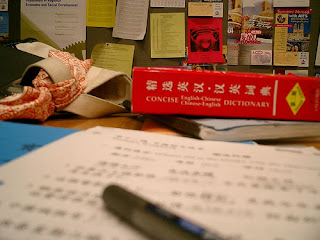
Usually the first lesson in a Chinese course includes phrases like:
- Hello
- How are you?
- I am fine
- Goodbye
These are useful phrases and you're probably going to use them often - so the sooner you learn them, the better.
Then you learn further, and you reach the chapter where you are meant to memorise words for various family relationships. Father & mother are easy enough, and it probably takes little more effort to learn these words than to actively decide
not to learn them.
But then the chapter offers words for: brother (big brother, little brother), sister (ditto), grandmother & grandfather (different words for paternal or maternal grandparents), aunts & uncles (with more variations) ... and my eyes glaze over.
The reality is I don't use these words often (not even in English) - so I'm certainly not likely to use them in Chinese. Sure, if someone talks to me about their family, I really ought to know who they mean, but not now.
In the meantime, I would rather learn other words, like: eat, drink, water, bathroom. And I could learn phrases like "Do you want to eat lunch now?, "Let's go", "What would you like to drink?" These are words & phrases which I definitely use, several times a week.
And to be honest, I still don't know what the word is for Grandmother. I just haven't bothered learning it. If I have use it with a non-English speaking person, I could cheat and say "my mother's mother" for example.
My suggestion to you is that if you're going to learn words, take the time to memorise words you'll use often. (For example, do you know how to say each of these words: now, later, earlier, usually, sometimes, always, never?)
And yes, I know that right after I post this, I could take 1 minute to learn the words for grandmother & grandfather. But I think I'll rather go look up the word for 'milkshake' ...
 The Chinese invented paper, so it's only fair that we should use it. And say it.
The Chinese invented paper, so it's only fair that we should use it. And say it.



